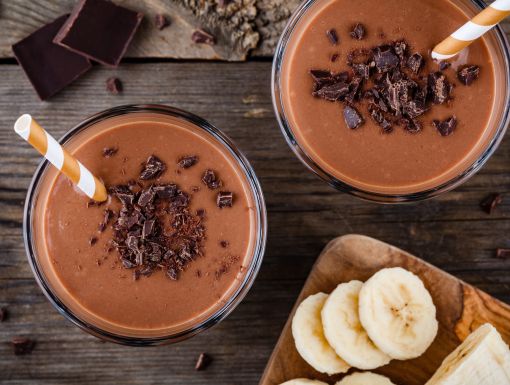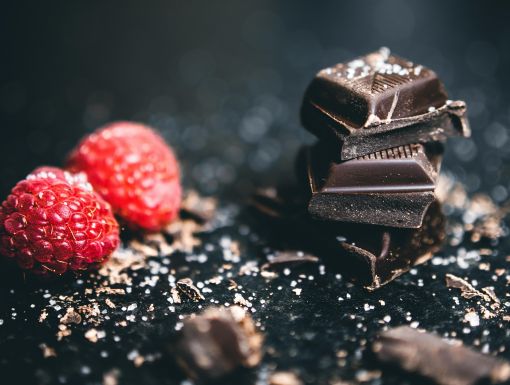
5 Health Benefits of Dark Chocolate and How to Choose the Best One
Here's good news for chocolate lovers: Studies show there can be potential nutritional benefits to consuming certain types of chocolate in moderation. But don’t run to the candy bar aisle just yet; not all chocolate bars are created equal.
Read on for a list of my go-to picks for better-for-you chocolate options, as well as a list of the health benefits of chocolate and what to look for on chocolate labels when the cravings hit.
What are the health benefits of dark chocolate?
Packed with antioxidants, nutrient-dense dark chocolate has been shown to have a number of health benefits. A few of them are:
- Improved blood pressure
- Improved cholesterol levels
- Decreased risk of cardiovascular disease
- Enhanced brain function
- Decreased stress levels
Just remember that eating too much of anything can be detrimental to your health. Moderation is key!
What should you look for when choosing a chocolate?
Natural cocoa is one of top sources of antioxidant-rich flavanols. Cacao is the raw bean from the cacao tree — what we refer to as "cocoa" — is made from cacao beans that have been roasted. But the more processed the cocoa, the lower the flavanol content.
- Look for products containing at least 70% cocoa. The higher the percentage, the more bitter (and less sweet) it will taste, but the healthier it is.
- Cocoa beans should always be listed first in the ingredient list.
- Avoid chocolate containing vegetable oil, butter oil, artificial sweeteners or milk substitutes. These are all indicators that the chocolate is subpar.
- Avoid "‘dutched" cocoa. Dutching refers to alkalizing the cocoa, which reduces flavonoid content.
- The fewer ingredients, the better.
Favorite picks for healthy dark chocolate
These products have cocoa powder and unsweetened chocolate at the top of their ingredient lists, and a cocoa content of at least 70%.
- Per ounce: 120 calories, 10 grams fat, 15 grams carb, 13 grams fiber, 0 grams sugar
- Ingredients include unsweetened chocolate, cocoa butter, almonds, sea salt, monkfruit extract, vanilla
- Vegan
Divine 70% Dark Chocolate Hearts
- For one piece: 120 calories, 9 grams fat, 9 grams carb, 2.5 grams fiber, 5.5 grams sugar
- Ingredients include cocoa mass (the first liquid stage of processing cocoa beans), sugar, cocoa butter, vanilla
- Vegan
Chocolate bars with 70% cocoa or higher:
- Chocolove (77% cocoa)
- Alter Eco (70% cocoa)
- Lily's Intensely Dark (92% cocoa)
- Chocolove Extreme Dark Chocolate (88% cocoa)
- Alter Eco Dark Blackout Chocolate (85% cocoa)
- Per ounce, each of these contain approximately 200 calories, 8-15 grams net carbs and 6-9 grams of sugar
OK picks for healthy dark chocolate
Be cautious about products labeled as dark chocolate but do not have a cocoa percent listed. Most are just 50% to 60% cocoa.
Dove “Dark” Chocolate Promises
- Per 4-piece serving: 170 calories, 19 grams carbs, 15 grams sugar
- Not really “dark” chocolate; Contains 60% cocoa, according to the company
- First ingredient listed is sugar
Chocolate to choose in moderation
Avoid products made with milk chocolate (10%-50% cocoa) and white chocolate (zero cocoa, therefore zero flavanols). Both of these are typically high in added sugar.
- Milk chocolate hearts: Such as Dove Promises, typical heart-shaped chocolates
- Dove milk chocolate promises: Per 4-heart serving: 180 calories, 18 grams carbs, 18 grams sugar; first ingredient is sugar
- White chocolate hearts and bars
- Lindt white chocolate: Per 3-truffle serving: 230 calories, 15 grams carbs, 15 grams sugar; first ingredient is sugar
To schedule a nutrition consult, whether virtually or in-person, contact us at nutrition@ochsner.org or call us at 504-733-1600.



